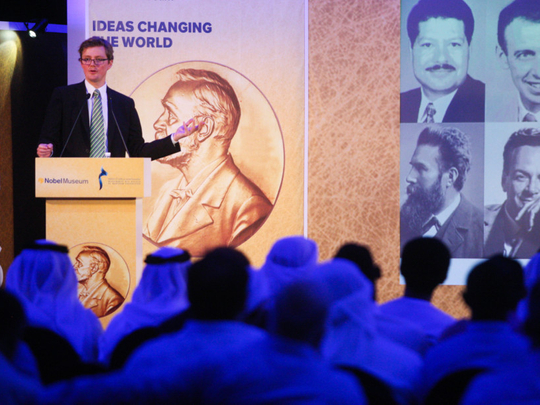
Dubai: The Nobel Prize not only highlights people’s achievements, it makes them known to a wider audience and inspires others to work harder and take things to a different level, said Dr Gustav Kallstrand, Chief Curator of the Nobel Museum, in one of the workshops held on the sidelines of the Nobel Museum.
“It is not a competition between nations, but can trigger creativity and can encourage governments to invest in people who have potential to do something that can shape the world,” he said.
Speaking on Sunday night about the contributions of Alfred Nobel — who laid the foundation for the world’s most famous award, the Nobel Prize, by bequeathing in his will all the revenues earned from his fortune to those who benefit mankind — Dr Kallstrand was keen on explaining the impact of the prize on various levels.
By having the travelling Nobel Museum exhibition visit countries, he said, schoolchildren will be inspired and there will be more scientists in the future.
“The Nobel legacy is a symbolism of knowledge. It shapes the world into a better place, not just produces better scientists. Nobel Laureates represent the institutions, nations and cities they came from. They have become well-known as figures and for their discoveries that affected people’s views.”
He said the Nobel Prize gets institutions, governments and foundations to speak about science and invest in people, who can be Nobel Laureates.
“Nations should help creative people, send people to creative places or create their own creative institutions.”
When we talk about the Nobel Prize, he said, we need to start by understanding the founder of the prize, Alfred Nobel. “Even today, over 120 years after his death, it is still the embodiment of his ideas. He wanted to make sure people who made contributions that changed the world were recognised and awarded.”
Dr Kallstrand said Nobel was a businessman, inventor and interested in philosophy and literature, but he also knew his ideas could change the industrial world in the 19th century by creating dynamite.
By inventing dynamite, he was working actively to make sure his ideas were being put to use and used in the market. During the industrial revolution, his invention helped build railroads, tunnels, railway tracks and helped allow communication and transportation.
Dr. Kallstrand said the Nobel Prize recognises people from all around the world with no bias.
“Based on a nomination system, which is being followed by four different institutions in Sweden who make the final prize decision, people from all around the world are also asked to take part in the evaluation,” he said.
Dr. Kallstrand pointed out how many years before, the huge money prize was what mattered the most to the Nobel Laureates, “but now it is more about the status they are receiving”.
“There’s a very small chance for people to win, which is what makes this prize have so much value, but it doesn’t mean that if they don’t win it they are losers. You don’t win this prize, you receive it. So many people deserve this prize every year but don’t get it, however, they are still influential.”
A Nobel Foundation Centre, he said, is expected to open in 2020 in Sweden, bringing the Nobel Laureates together in one place to meet others and inspire them.
Running from March 29 to April 30 at the Burj Khalifa Annex, the museum, which has been brought to the region for the first time by the Mohammad Bin Rashid Al Maktoum Foundation and highlights the prestigious position of the Nobel Prize in honouring outstanding individuals who have transformed the world in five different fields: physics, chemistry, medicine, literature and peace.








